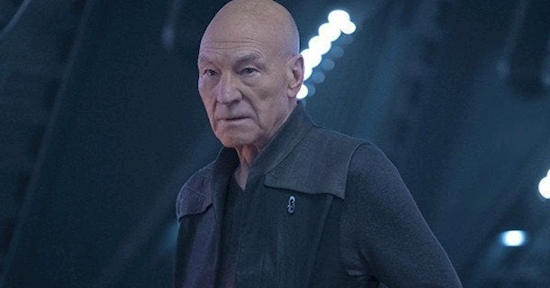Star Trek: Picard Showrunner Wanted to Examine What Utopia Really Meant
Star Trek: Picard’s showrunner wanted to really examine what a Utopia meant in the new series. Both Michael Chabon and series star Patrick Stewart talked to the Los Angles Times about how Picard tackles those ideas in a new way. It’s not uncommon to hear Star Trek be pegged as utopian or unrealistic in conversation. But, Chabon wanted to make clear that “utopia” doesn’t mean that everything is solved and wrapped up in a neat little bow. In fact, there are still many corners of this universe that haven’t been poked or prodded yet, and that’s what makes the approach with Picard stick out.
Chabon offered, “The rap on “Star Trek” is it’s utopian, optimistic. Over the years, a lot of these things have been tossed out by writers, like, “Yes, we don’t have money” and “Yes, we don’t have war” and all these admirable things, but we aspired to say, “What does that actually mean?” What does it mean that Jean-Luc Picard owns a winery? This is a 50-plus-year-old machine where people haven’t dug around inside too much.”
The series star also weighed in on how this new approach fleshes out Picard in interesting ways. “Michael, you also introduced emotional disturbances in Picard which had not been present before … like his experience as a partially assimilated [cybernetic organism] Borg. There was no real residue from it. But there has to have been,” Steward mused. “What has it been like for the past 25 years, having gone through that incredibly traumatic experience and never having had the chance to talk about it or reckon with it or purge it?”
Executive producer Akiva Goldsman has been adamant since before the show premiered that this is not a sequel to The Next Generation. In comments to Hollywood Outbreak, "Well we pointedly wanted to not make a sequel to Next Gen. I think that tonally, it's a little bit of a hybrid. Obviously it’s – you will see, I hope – slower, more gentle, more lyrical. It is certainly more character-based.”
“It also takes on the same thing that The Original Series took on, that Next Gen took on, that Discovery takes on, which is a hope for a future that is in many ways better than the world we live in today,” Goldsman continued. “Star Trek remains aspirational and what we get to do that DS9 got to do a little bit and Discovery got to do is to tell serialized stories, and in serialized storytelling, the characters can evolve in a way that makes it unique. So we think it's a new kind of Star Trek show, made by a lot of people who love all the old kinds of Star Trek."
How have you been enjoying Picard so far? Let us know down in the comments!
Disclosure: ComicBook is owned by CBS Interactive, a division of ViacomCBS.
Source: comicbook.com

